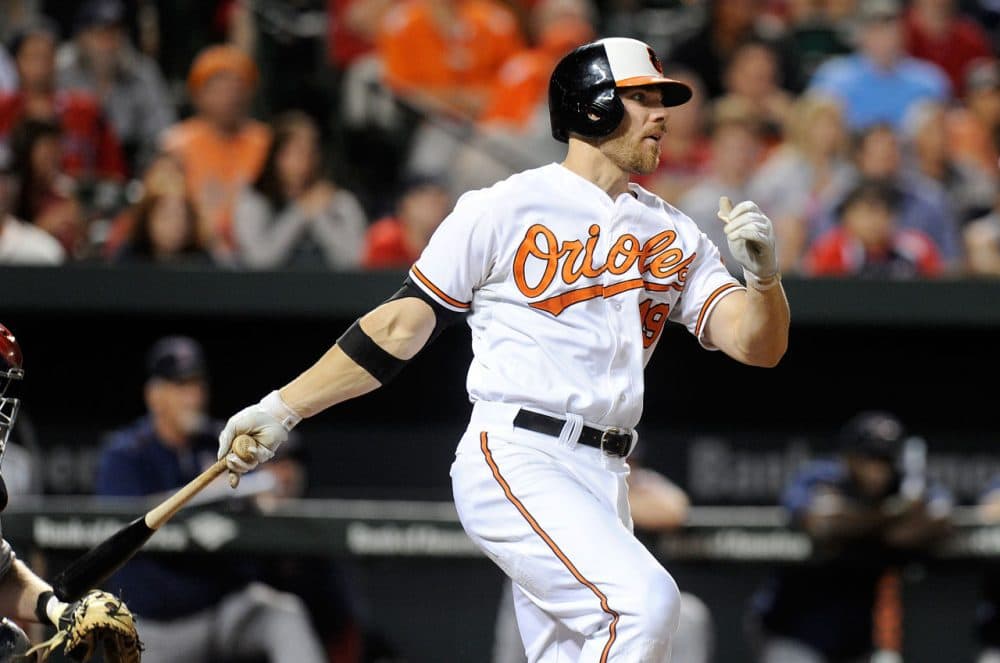Advertisement
MLB's Statistically Improbable Home Run Spike Flummoxes The Experts
Resume
"Look, I'm a geek, I know that I get into all this stuff," Neil Greenberg says. "But sometimes the emails I get — I'm like, nerd alert."
Greenberg writes about sports analytics for the Washington Post, and he gets a lot of emails. I suppose it stands to reason that some number of those emails would be rather nerdy.
Many of this week's emails offer possible explanations for a mystery, a mystery Greenberg recently spent a lot of time and effort trying to explain.
"Ugh," he says. "This was a long one because we wanted to make sure that we talked to a lot of people, executives, scouts, players, people outside of baseball, people that are involved in testing of the equipment. We just wanted to make sure we covered all of our bases."
The mystery Neil Greenberg was trying to solve? Why after home runs had been on the decline for the past couple of years, did the trend suddenly reverse?
Last year, Greenberg says, Major League Baseball saw a spike in home runs. And not a little spike. Home runs increased by 17.3 percent — that's 723 more home runs than anyone had reason to expect. Greenberg began his quest to solve the mystery at Princeton University, where he asked a math professor named Dr. Robert Vanderbie to calculate the odds of such a spike. His answer?
NG: He said zero. And that's when I said to him, 'But it happened!" He wasn't a baseball nerd like I am, but obviously he knows math. And I gave him the past couple years. And I explained to him there's been this downturn in offense and this downturn in home runs and then we have this big spike. He said that statistically speaking, we should never see something like this.
Batters aren't making more contact. But they are making better contact, and more fly balls actually became home runs. That to me suggested a livelier ball.
Neil Greenberg
BL: Alright, let's talk about a few things that don't explain the enormous increase in home runs last year and maybe you can give me as close to a one-sentence answer as you can for each allegedly disproven theory, OK?
NG: Sure.
BL: Smaller ballparks?
NG: There's been no great change that would have that dramatic of an effect.
BL: Climate change?
NG: The average temperature was a percentage of a degree. There's no impact there
BL: Changes in equipment? Let's say bats first.
NG: So, there's been a change in the amount of maple bats being used but I talked to an expert in the field and he said it wouldn't make any different.
BL: An expert in the field of trees...
NG: Actually, it was a physics expert that works with materials, and he was pretty adamant that it would make no difference.
BL: OK, the much more likely culprit: change in the baseball itself, flies further because it's wound tighter or something like that.
NG: Yeah, this seemed like the most likely answer. And I don't want to say that baseball changed the baseball or Rawlings changed the baseball, but there aren't more fly balls being hit. Batters aren't making more contact. But they are making better contact, and more fly balls actually became home runs. That to me suggested a livelier ball. A scout who had been part of baseball for 30 years, he actually did some studies of his own dropping balls out of windows, second story windows, to see which bounces harder. When I spoke to him, the numbers do support some type of change in equipment.
BL: The red flag that comes up for me has to do with the term that you have used to describe these more and more home runs which is a 'spike' in home runs. Whose to say that spikes aren't involved: spikes full of PEDs that they haven't figured out how to test for yet?
NG: It's certainly possible that there's something out there that isn't being picked up by baseball's drug program, but you'd have to have every player or a large majority of players using some sort of banned substance, which to me seems a little but unlikely. Now, I'm saying this — writing about something that had mathematically had a zero percent chance of happening, but that's what we're seeing here. We're seeing either something amiss in terms of, like you said, PEDs or some sort of equipment variance or it's just the perfect storm of a lot of little things that happen to go right in one season.
BL: Maybe we've just entered baseball's age of anomalies. Last year, we had 700 too many home runs and this year the Cubs will win the World Series.
NG: Yeah, they certainly look like they can. That to me would probably show that we are in just a weird world, right? Everything that could possibly never happen had been happening. And then I have to stock up on canned goods I guess. I don't know what I would do.
This segment aired on March 12, 2016.
